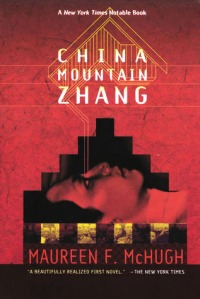These are my first impressions after reading China Mountain Zhang (Maureen F. McHugh, 1992) in June 2014.
 In the 22nd century, when China is the dominant superpower and the US has had a socialist revolution, Zhang is trying to figure out what to do with his life.
In the 22nd century, when China is the dominant superpower and the US has had a socialist revolution, Zhang is trying to figure out what to do with his life.
Whenever I read futuristic science fiction written during the Cold War that assumes the Soviet Union continued as a superpower, I find myself mentally substituting “China” for Soviet Union, just to keep the story believable for me. Now here’s a book written in the ’90s that actually does posit China as the dominant superpower, and of course, it’s a lot different and more realistic than those Soviet-era books. For one thing, the United States has declined quite a lot, as well as having undergone its own socialist revolution. This version of the near future also brings in questions of race — people of Chinese ethnicity have privilege here — sexuality, and gender as well as politics.
This future is not dystopian, not really (although I’m sure many Americans would consider a socialist USA the worst thing that could ever happen). It’s far too realistic for that. The characters are all ordinary people with ordinary concerns about work, success, love, and community. I think that’s why I enjoyed this book so much–the story is told by real people with the minor concerns of real life, but it maintains a broad scope. The story begins and ends in New York City, but it travels to an Arctic research station, a rich and glittering Shanghai, even Mars.
The characters, however, are all people who don’t quite fit into this new normal. The protagonist, Zhang, is gay and half Latino (which has been obscured by genetic manipulation), who must keep both these aspects of himself secret in order to get ahead. He chafes against these restrictions and longs for community, finally choosing to do something very American: he starts his own business. Other sections of the book are told from the points of view of characters that Zhang meets peripherally. One is a Chinese woman with a medical condition that has rendered her “ugly”; once she has that corrected, she unexpectedly faces the possibly worse problems of pretty girls. Another is a loner who has finally moved to a commune on Mars in order to be left alone, but yet finds herself reluctantly helping to build her new community.
These are quiet stories, and the events that take place are not big ones. Without the technological enhancements, all of these stories could take place today. Through her speculative premise, McHugh shines a light on the persistent tensions that characterize the human species: the tension between conformity and individuality, and the desire we all have to make our own lives and to truly be ourselves.
China Mountain Zhang won the James Tiptree Award, Locus Award for best first novel, and Lambda Literary Award.